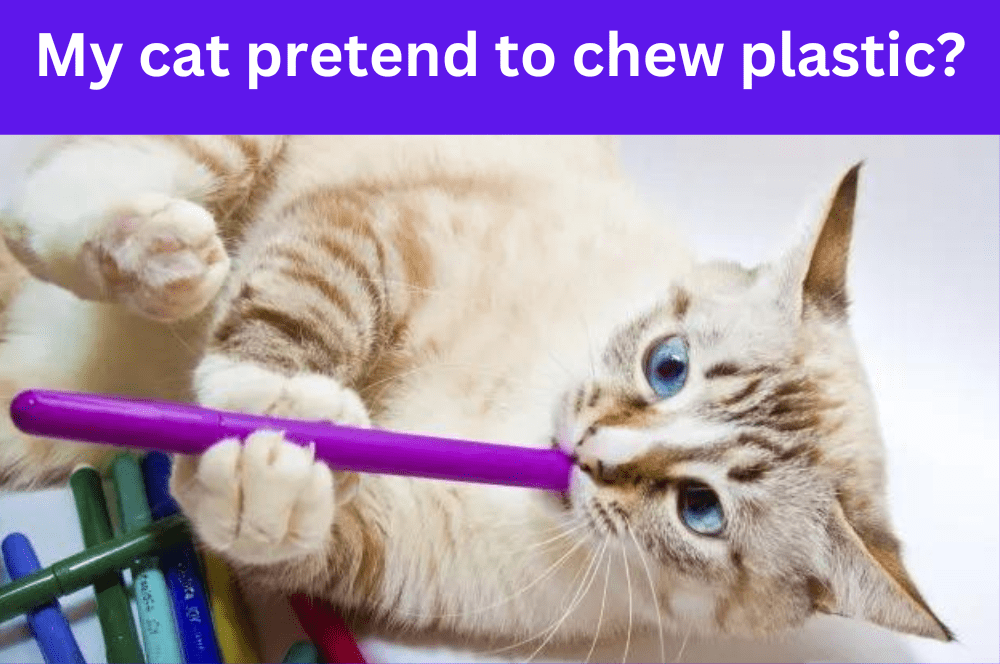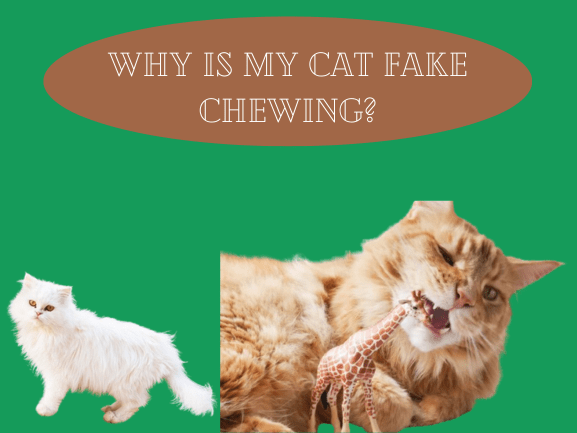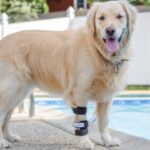If you have ever noticed your cat making a chewing motion without anything in its mouth, you might wonder what is going on. Is your cat hungry, bored, or sick? You think Why is my cat fake chewing?
Cat fake chewing is a behavior that can have various causes, ranging from harmless to serious. In this article, we will explore some of the possible reasons behind this puzzling feline habit and how to deal with it.
Contents
Why is my cat fake chewing? Possible Reasons
Oral Diseases
One of the most common and worrisome causes of cat fake chewing is oral disease. More than 50% of cats older than 4 years of age have some degree of dental disease. This can include conditions such as:
- Periodontal disease: an infection of the gums and teeth caused by bacteria. This can cause inflammation, pain, and tooth loss.
- Feline chronic gingivostomatitis: a severe form of gum inflammation that can affect the whole mouth and cause ulcers, bleeding, and difficulty eating.
- Abscessed tooth: a pus-filled infection of the tooth or the surrounding tissue that can cause swelling, fever, and bad breath.
- Broken tooth: a fracture or crack in the tooth that can expose the nerve and cause sensitivity, pain, and infection.
These oral diseases can make your cat feel uncomfortable and unable to close its mouth properly. As a result, your cat may start fake chewing to relieve the pain or discomfort. Other signs of oral problems in cats include:
- Drooling
- Bad breath
- Loss of appetite
- Weight loss
- Pawing at the mouth
- Bleeding from the mouth
- Difficulty chewing or swallowing
If you suspect that your cat has any of these symptoms, you should take it to the vet as soon as possible. Oral diseases can affect your cat’s overall health and quality of life. Your vet can diagnose the problem and provide the appropriate treatment, which may include antibiotics, painkillers, or dental surgery.
Teething
Another possible cause of cat fake chewing is teething. Just like human babies, kittens go through a phase when they lose their baby teeth and grow their adult teeth. This process usually starts at around 3 months of age and ends by 6 months of age.
During this period, your kitten may experience some discomfort, itching, or soreness in its gums. To ease the pain, your kitten may chew on various objects, including the air. You may relieve your kitten’s sore and swollen gums by giving them ice cubes or cold water. Other symptoms of teething in kittens include:
- Decreased appetite
- Excessive chewing
- Slight bleeding of the gums
- Drooling
- Pawing at the mouth
Teething is a normal and temporary stage in your kitten’s development. You can help your kitten by providing it with safe and appropriate toys to chew on, such as rubber balls, plush toys, or dental chews. You should also monitor your kitten’s mouth regularly and check for any signs of infection or abnormality.
Flehmen Response
A less common but harmless cause of cat fake chewing is the flehmen response. This is a behavior that cats use to analyze and identify different smells in their environment. Cats have a special organ called the Jacobson organ, located on the roof of their mouth, that allows them to detect pheromones and other chemical signals.
When your cat encounters an interesting or unfamiliar scent, it may open its mouth and curl its upper lip to draw the air into its Jacobson organ. This helps your cat to process the information and understand the source of the smell. Some cats may also make a chewing motion as they do this.
The flehmen response is most commonly seen in male cats, especially when they smell the urine or feces of a female cat in heat. However, both male and female cats can exhibit this behavior in response to any scent that catches their attention, such as food, plants, or other animals.
The flehmen response is a natural and harmless behavior that does not indicate any problem or discomfort in your cat. It is simply a way for your cat to communicate and explore its surroundings. You do not need to do anything about it unless you notice that your cat is doing it excessively or obsessively, which may indicate stress or anxiety.
Suggested: Why Do Cats Knead And Bite Blankets?
Why Do My Cats Lick Each Other?
Why does my cat make weird chewing noises?
If you have ever heard your cat make weird chewing noises, you might have wondered what is going on. Is your cat hungry, sick, or just quirky? The answer depends on the context and the frequency of the behavior.
Some possible reasons why your cat makes weird chewing noises are:
Dental Problems
Your cat might have tooth decay, gum disease, or a broken tooth that causes pain or discomfort when eating or grooming. This can make your cat chew more loudly or awkwardly than usual.
You should check your cat’s mouth for any signs of inflammation, bleeding, or bad breath, and take your cat to the vet if you notice any problems.
Hairballs
Your cat might be trying to get rid of a hairball that is stuck in its throat or stomach. Hairballs are clumps of fur that accumulate when your cat swallows hair during grooming.
They can cause coughing, gagging, vomiting, or chewing noises. You can help your cat prevent hairballs by brushing its fur regularly and providing it with a hairball remedy or a high-fiber diet.
Pica
Your cat might have a condition called pica, which is the urge to eat non-food items, such as plastic, wool, paper, or rubber. Pica can be caused by nutritional deficiencies, boredom, stress, or genetic factors.
It can also be a sign of an underlying medical issue, such as anemia, hyperthyroidism, or diabetes. You should consult your vet if your cat exhibits pica, as it can lead to serious complications, such as intestinal blockage or poisoning.
Curiosity
Your cat might just be curious about the taste or texture of something, such as your food, your fingers, or a toy. Cats are naturally inquisitive and like to explore their environment with their mouth.
This can sometimes result in chewing noises, especially if the item is crunchy, chewy, or squeaky. As long as your cat is not ingesting anything harmful or excessive, this behavior is usually harmless and normal.
Why is my cat chewing in the air?
If you have ever seen your cat chewing in the air, you might have wondered what it is doing. Is your cat trying to catch a fly, smelling something, or having a seizure? The answer depends on the situation and the frequency of the behavior.
Some possible reasons why your cat is chewing at the air are:
Flehmen response: Your cat might be performing a flehmen response, which is a way of smelling and tasting pheromones or other chemicals in the air. Cats have a special organ called the vomeronasal organ, located in the roof of their mouth, that allows them to detect these signals. When your cat does a flehmen response, it opens its mouth slightly, curls its upper lip, and chews or licks the air. This behavior is more common in male cats, especially when they encounter a female cat in heat or a rival cat’s territory.
Nausea: Your cat might be feeling nauseous, which can cause it to drool, lick its lips, or chew at the air. Nausea can be caused by various factors, such as motion sickness, food intolerance, poisoning, infection, or medication. You should monitor your cat for any other signs of illness, such as vomiting, diarrhea, loss of appetite, or lethargy, and take your cat to the vet if the symptoms persist or worsen.
Oral discomfort: Your cat might have something stuck in its mouth, such as a piece of food, a bone, a string, or a foreign object. This can cause your cat to paw at its mouth, shake its head, or chew at the air. You should check your cat’s mouth for any signs of injury, swelling, or obstruction, and remove the item if possible. If you cannot remove the item or if your cat is in pain, you should take your cat to the vet immediately.
Seizure: Your cat might be having a seizure, which is a sudden and abnormal electrical activity in the brain. Seizures can cause various symptoms, such as twitching, convulsing, drooling, or chewing in the air. Seizures can be triggered by various factors, such as epilepsy, brain tumors, trauma, infection, or poisoning. You should seek emergency veterinary care if your cat has a seizure, as it can be life-threatening.
Why does my cat pretend to chew plastic?
If you have ever noticed your cat pretending to chew plastic, you might have wondered what it is up to. Is your cat hungry, bored, or crazy? The answer is not so simple, as there are different reasons why cats might exhibit this behavior.
Some possible reasons why your cat pretends to chew plastic are:
Pica: Your cat might have a condition called pica, which is the urge to eat non-food items, such as plastic, wool, paper, or rubber. Pica can be caused by nutritional deficiencies, boredom, stress, or genetic factors. It can also be a sign of an underlying medical issue, such as anemia, hyperthyroidism, or diabetes. You should consult your vet if your cat exhibits pica, as it can lead to serious complications, such as intestinal blockage or poisoning.
OCD: Your cat might have a form of obsessive-compulsive disorder (OCD), which is a mental disorder that causes repetitive and compulsive behaviors, such as chewing, licking, or scratching. OCD can be caused by stress, anxiety, trauma, or genetic factors. It can also be a symptom of an underlying medical issue, such as allergies, infections, or hormonal imbalances. You should consult your vet if your cat exhibits OCD, as it can affect its quality of life and well-being.
Play: Your cat might just be playing with the plastic, as it finds it fun, stimulating, or satisfying. Cats are naturally curious and playful, and they like to explore their environment with their mouth. Plastic can provide a variety of sensations, such as noise, texture, or taste, that can appeal to your cat’s senses. As long as your cat is not ingesting the plastic or damaging it, this behavior is usually harmless and normal.

Do cats chew when they’re bored?
If you have ever wondered why your cat chews on things, you might have assumed that it is because it is boring. While boredom can be one of the reasons why cats chew, it is not the only one. Cats chew for various reasons, such as:
Dental health: Cats chew to keep their teeth and gums healthy and clean. Chewing can help remove plaque, tartar, and bacteria from their mouth, and prevent dental problems, such as tooth decay, gum disease, or bad breath. You should provide your cat with appropriate items to chew on, such as dental treats, chew toys, or raw bones, and avoid giving them anything too hard, sharp, or toxic.
Nutrition: Cats chew to get essential nutrients that they might be lacking in their diet. Chewing can help them obtain vitamins, minerals, enzymes, or fiber that they need for their health and digestion. You should feed your cat a balanced and high-quality diet that meets their nutritional needs, and supplement it with fresh or dried herbs, grasses, or fruits, if necessary.
Stress Relief: Cats chew to cope with stress, anxiety, or frustration that they might be experiencing in their environment. Chewing can help them release tension, calm their nerves, or distract themselves from their problems. You should identify and eliminate the sources of stress for your cat, such as loud noises, unfamiliar people, or territorial disputes, and provide them with a safe and comfortable space to relax and unwind.
Boredom: Cats chew to alleviate boredom, which can result from a lack of stimulation, activity, or socialization in their daily routine. Chewing can provide them with the entertainment, challenge, or satisfaction that they crave. You should enrich your cat’s environment with toys, puzzles, or interactive games that can keep them engaged and happy, and spend quality time with them every day.
Conclusion
Why is my cat fake chewing? Cat pretend fake chewing is a behavior that can have different causes, depending on the context and the symptoms. If your cat is fake chewing due to oral diseases, you should take it to the vet for diagnosis and treatment.
If your cat is fake chewing due to teething, you should provide it with safe and appropriate toys to chew on. If your cat is fake chewing due to the flehmen response, you do not need to worry, as it is a normal and harmless behavior.
We hope this article has helped you understand why your cat is fake chewing and what to do about it. Remember to always pay attention to your cat’s behavior and health, and consult your vet if you have any concerns.
FAQs: Why is my cat fake chewing?
Q: Cat chewing on nothing and purring
A: Your cat might be chewing on nothing and purring because it is feeling happy, relaxed, or content. Purring is a way of expressing positive emotions, such as affection, comfort, or satisfaction. Chewing on nothing might be a sign of self-grooming, which is also a soothing and pleasurable activity for cats. Your cat might also be mimicking the action of nursing, which is associated with maternal care and security. As long as your cat is not showing any signs of distress, pain, or illness, this behavior is usually harmless and normal.
Q: Cat turning head and chewing
A: Your cat might be turning its head and chewing because it is trying to get rid of something that is bothering its mouth, such as a piece of food, a hairball, or a foreign object. Your cat might also be experiencing some oral discomfort, such as toothache, gum inflammation, or mouth ulcer. You should check your cat’s mouth for any signs of injury, infection, or obstruction, and take your cat to the vet if you notice any problems. Alternatively, your cat might be turning its head and chewing because it is smelling or tasting something in the air, such as a pheromone, a scent, or a flavor. This is part of the flehmen response, which is a way of analyzing chemical signals with the vomeronasal organ. This behavior is more common in male cats, especially when they encounter a female cat in heat or a rival cat’s territory.
Q: Is chewing normal for cats?
A: Chewing is a normal and natural behavior for cats, as long as it is done on appropriate items and in moderation. Chewing can have various benefits for cats, such as:
- Improving dental health by removing plaque, tartar, and bacteria from their teeth and gums.
- Providing essential nutrients that they might be lacking in their diet, such as vitamins, minerals, enzymes, or fiber.
- Relieving stress, anxiety, or frustration that they might be feeling in their environment.
- Alleviating boredom can result from a lack of stimulation, activity, or socialization in their daily routine.
- Satisfying their curiosity, playfulness, or hunting instincts, which are part of their natural behavior
However, chewing can also become a problem if your cat is chewing on inappropriate, harmful, or excessive items, such as plastic, wool, paper, rubber, wires, or furniture. This can indicate a condition called pica, which is the urge to eat non-food items.
Pica can be caused by nutritional deficiencies, boredom, stress, or genetic factors. It can also be a sign of an underlying medical issue, such as anemia, hyperthyroidism, or diabetes. You should consult your vet if your cat exhibits pica, as it can lead to serious complications, such as intestinal blockage or poisoning.
`




